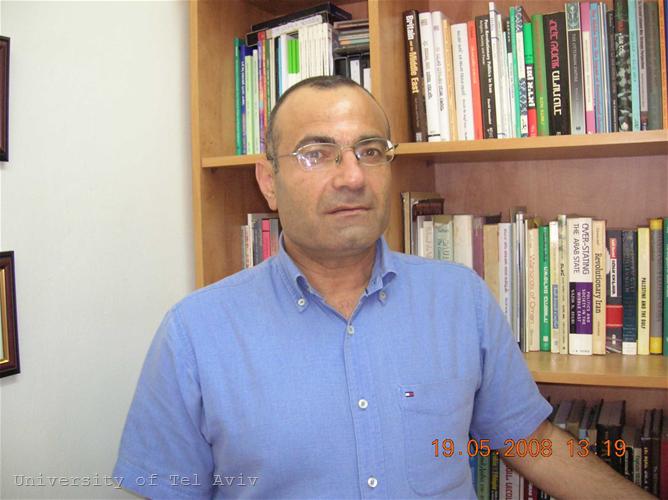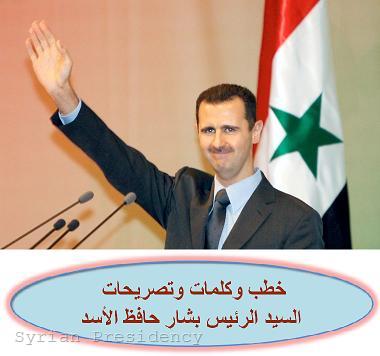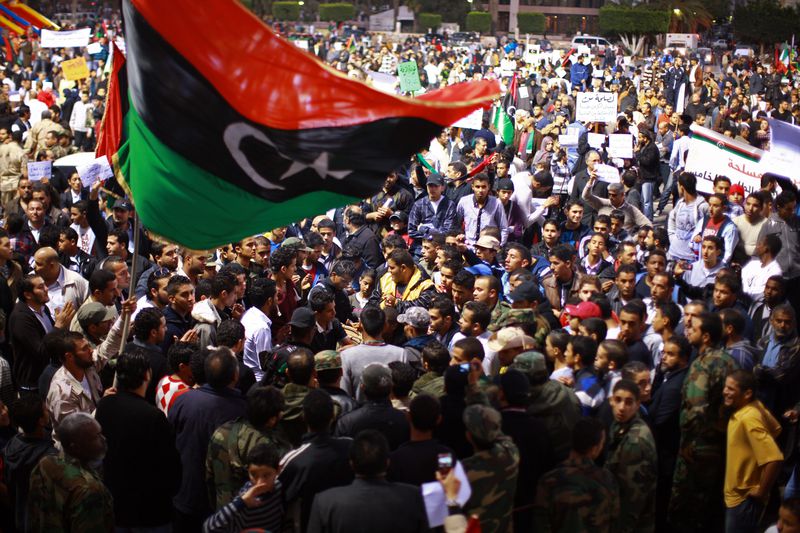Gaddafi's final countdown
Ralitsa Kovacheva, August 24, 2011
 Nobody knows where Muammar Gaddafi is. And it appears as nobody in his former bastion Tripoli cares about that. The rebels are celebrating their victory on the Green Square, although they still don’t have complete control over the city and at some places fighting is still going on against the Colonel's loyalists. The state radio and television, however, are in the hands of the new power. For the first time in months Libyans can freely use the internet - the symbol of the Arab revolutions.
Nobody knows where Muammar Gaddafi is. And it appears as nobody in his former bastion Tripoli cares about that. The rebels are celebrating their victory on the Green Square, although they still don’t have complete control over the city and at some places fighting is still going on against the Colonel's loyalists. The state radio and television, however, are in the hands of the new power. For the first time in months Libyans can freely use the internet - the symbol of the Arab revolutions.
While NATO said it would continue its mission in Libya to protect civilians, world leaders urged Gaddafi to step down immediately and without further bloodshed. The European Union congratulated the rebels for their courage and vowed to continue its support for the changes in Libya. ”Today Libya is entering a new era […] It is now time to launch a process of transition towards a new Libya, in which democratic principles, justice and human rights are fully respected […] For its part the EU will continue to offer support and will remain a strong and committed partner for the Libyan people,” EU's High Representative for Foreign Affairs and Security Policy Catherine Ashton said in a special statement.
“The developments in Libya are giving fresh momentum to the Arab Spring. The  quest of the people in the region for freedom and dignity will continue. The European Union stands by them and supports their democratic aspirations and choices,” a joint statement by the President of the European Council, Herman Van Rompuy, and European Commission President Jose Manuel Barroso stated. And the President of the European Parliament, Jerzy Buzek, commented: “This is also a strong sign for the entire region. No dictator will be able to continue his reign through the brutal use of force. The fall of Gaddafi is a writing on the wall for Bashar al-Assad [president of Syria], Ali Abdullah Saleh [president of Yemen] and many others. They should listen to the aspirations of their people and step aside.”
quest of the people in the region for freedom and dignity will continue. The European Union stands by them and supports their democratic aspirations and choices,” a joint statement by the President of the European Council, Herman Van Rompuy, and European Commission President Jose Manuel Barroso stated. And the President of the European Parliament, Jerzy Buzek, commented: “This is also a strong sign for the entire region. No dictator will be able to continue his reign through the brutal use of force. The fall of Gaddafi is a writing on the wall for Bashar al-Assad [president of Syria], Ali Abdullah Saleh [president of Yemen] and many others. They should listen to the aspirations of their people and step aside.”
The largest group in the European Parliament – the European People's Party - congratulated “the international community for its resolve and readiness to continue the air campaign against Colonel Gaddafi's military facilities. Even though at times it may have seemed as if the operations did little to help the protesters, in fact their effect has been tremendous in destroying the dictator's power of strike and in protecting civilian lives.” The EPP group also calls on “the relevant bodies of the European Union to commit all necessary resources, both human and financial, to help in the process of rebuilding Libya.”
Daniel Cohn-Bendit, Greens/EFA co-president, said that the EU should develop an effective strategy to support Libya's democratic transition. “The European Parliament must be kept informed of any initiatives taken by the EU to ensure a successful outcome for this phase of transition and rebuilding and we therefore ask Ms Ashton to present the EU's strategy at the European Parliament's next plenary session (12 - 15 September).”
 British Prime Minister David Cameron made a statement after a meeting of the National Security Council devoted to the situation in Libya. “Clearly the immediate priority today is to establish security in Tripoli,” Mr Cameron said, warning that “there can be no complacency”, because the real work of rebuilding the country is forthcoming. “This will be a Libyan-led and Libyan-owned process with broad international support,“ the British Prime Minister underlined. It was also made clear a day before that Britain would not deploy ground forces in Libya under any circumstances. The reaction of US President Barack Obama was restrained like the overall US behaviour in the Libyan operation, as the White House gave a clear sign that it did not foresee further serious interference in the future.
British Prime Minister David Cameron made a statement after a meeting of the National Security Council devoted to the situation in Libya. “Clearly the immediate priority today is to establish security in Tripoli,” Mr Cameron said, warning that “there can be no complacency”, because the real work of rebuilding the country is forthcoming. “This will be a Libyan-led and Libyan-owned process with broad international support,“ the British Prime Minister underlined. It was also made clear a day before that Britain would not deploy ground forces in Libya under any circumstances. The reaction of US President Barack Obama was restrained like the overall US behaviour in the Libyan operation, as the White House gave a clear sign that it did not foresee further serious interference in the future.
The Bulgarian Foreign Ministry also called “Gaddafi to surrender, in order fire to  stop and a peaceful political dialogue to begin between all actors in Libya’s social life.” Bulgaria welcomed the constitutional declaration presented by the National Transitional Council as “a good basis for building a representative and legitimate state of all Libyans” and declared its “strong support for the territorial integrity of Libya.”
stop and a peaceful political dialogue to begin between all actors in Libya’s social life.” Bulgaria welcomed the constitutional declaration presented by the National Transitional Council as “a good basis for building a representative and legitimate state of all Libyans” and declared its “strong support for the territorial integrity of Libya.”
 In aan interview with the CNN former Libyan Prime Minister Mustafa Ben Halim, who ruled the country before the Gaddafi era, said the Colonel would not admit a defeat but rather he would flee abroad and continue the fight. “The new people -- and I know some of them and they are excellent people … have to try to start making a real government, a government which guarantees freedom, which is based on a good foundation ... a government which is everyone is contributing in it and take care that the there is a new generation.”
In aan interview with the CNN former Libyan Prime Minister Mustafa Ben Halim, who ruled the country before the Gaddafi era, said the Colonel would not admit a defeat but rather he would flee abroad and continue the fight. “The new people -- and I know some of them and they are excellent people … have to try to start making a real government, a government which guarantees freedom, which is based on a good foundation ... a government which is everyone is contributing in it and take care that the there is a new generation.”
Anticipating the final victory of the rebels, however, the information what exactly is going on in Tripoli remains contradictory. The National Transitional Council announced that Gaddafi's sons Saif al-Islam and Mohammed Gaddafi were arrested and hidden in a safe place. Saif al-Islam, however, appeared in good health and full of adrenaline, as described by BBC correspondent Matthew Price in Tripoli, at the hotel where foreign journalists were staying. “We broke the backbone of the rebels,” Saif al-Islam said. The information that rebels have control over 95 percent of the capital and victory is near, cannot be confirmed, Matthew Price noted.
Still nobody knows where Colonel Gaddafi is. The longest-governing Arab leader, if  a dictator as Gaddafi may be called so, is probably watching the defeat of his regime hidden in a bunker or while trying to flee abroad, without even having a chance to make one of his favourite prolonged televised statements. No one will miss them for sure. The Gaddafi era has ended yet with the first riots in Libyan streets. Now the Libyans, like people in Tunisia, Egypt and everywhere where the Arab spring came or it is only budding, should learn the most difficult lesson - to rule themselves their countries and their lives.
a dictator as Gaddafi may be called so, is probably watching the defeat of his regime hidden in a bunker or while trying to flee abroad, without even having a chance to make one of his favourite prolonged televised statements. No one will miss them for sure. The Gaddafi era has ended yet with the first riots in Libyan streets. Now the Libyans, like people in Tunisia, Egypt and everywhere where the Arab spring came or it is only budding, should learn the most difficult lesson - to rule themselves their countries and their lives.
 | © University of Tel Aviv
| © University of Tel Aviv | © Syrian Presidency
| © Syrian Presidency | © UN
| © UN